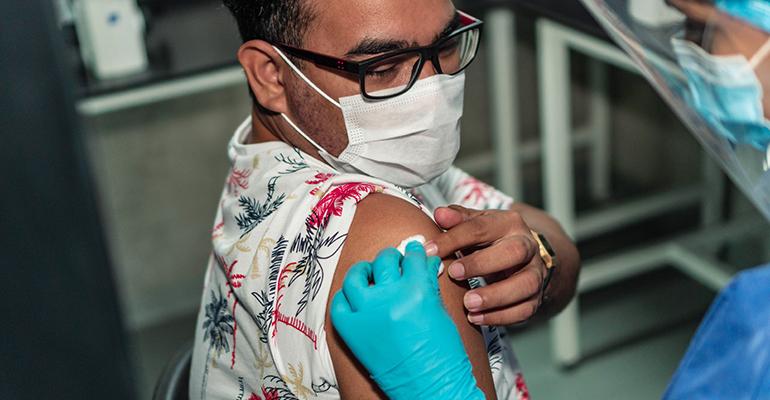- States that are not already providing priority vaccine access to frontline food workers must act to do so, and employers must provide workers with paid time off to enable them to get vaccinated, United Food and Commercial Workers (UFCW) International Union president Marc Perrone said during a press conference Tuesday.
- COVID-19 infections among people who work in grocery stores, meat-packing plants and other frontline food industry positions have been rising at a faster pace during the past 60 days than they were earlier in the pandemic, Perrone said.
- The UFCW is pressing government and industry officials to help expedite COVID-19 shots as part of a broader campaign to win better working conditions for its members.
Speaking during the press conference, Perrone said the union recognizes that people who work in healthcare, law enforcement or are over 65 should be first in line for vaccinations, but he said that doesn’t mean people in the food industry shouldn’t also receive favorable positions in line.
“We’re not saying that these workers need to be first, but they shouldn’t be last, either,” Perrone said. “Our elected leaders, they must work with us. The food and retail CEOs [must] ensure that the vaccine is free for all essential workers and that these workers have paid time off to receive each dose. They can’t stand in line for hours and hours, because they have to be at work, where many of us can be at home.”
Only a fraction of states currently include grocery workers among the vaccination phases they are currently in despite guidance issued by the Centers for Disease Control and Prevention in December that said workers in these roles should receive priority for shots.
Among the more than 4,000 member respondents to a recent survey by the UFCW, 70% are ready to get vaccinated against COVID-19 and 57% are more concerned about the pandemic than they were 30 to 60 days ago, Perrone said Tuesday. COVID-19 has led to the deaths of 137 grocery workers, and more than 30,000 have been infected or exposed to the disease, according to the union.
Perrone also pressed grocers to end their resistance to providing hazard pay to workers, noting that multiple municipalities, including Seattle and Oakland, California, have recently enacted ordinances requiring extra pay for supermarket employees and additional jurisdictions are considering similar measures.
Grocery and meat-packing workers who spoke during the press conference said they face unacceptable conditions at their jobs. Workers for Kroger and Albertsons said their stores are understaffed despite the fact that business is booming.
Perrone added that the UFCW is not in a position to call a strike against the grocer chains where its members work because its collective bargaining agreements with the companies contain “no strike, no lockout” clauses.
“However, if workers felt … that their health and safety was at such a risk that they had no other choice, under OSHA standards they might be able to … voice their opinions in a protected concerted activity,” Perrone said, referring to the Occupational Safety and Health Administration, which regulates and oversees workplace conditions.
Source: Grocery Dive
